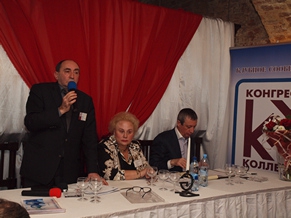|
Euroasian Jewish News

Yuri Raskin opens the meeting
|
EAJC Congress College Meeting: “Economics must be!”
01.04.2012 On February 29, the Congress College under the aegis of the Euro-Asian Jewish Congress held a new meeting in the expanded “Business-club evening” form. The main part of the evening was the plenary meeting titled “Economics must be!” Before the plenary meeting there were two hours of an informal “Business five o'clock.”
The different forums held several events: a meeting of the Board on Quality of Life and the Consumer Market (Head of the Board – Chairman of the Consumers Union of the Russian Federation Petr Shelish); consultations on real estate and land and property regulations given by the President of the Russian Realtor's Guild, Director General of the “BEST-Nedvizhimost” Grigoriy Poltorak; consultations with the Director General of the “Tonap” investment group Dmitriy Chuhlantsev on financing investment projects.
The plenary meeting was held in round table form, and was opened and led by the Congress College Chairman, EAJC Vice President Yuri Raskin. The meeting was moderated by the President of the Russian Financial Corporation Bank, the 1992-1993 Minister of Economics of the Russian Federation Andrei Nechayev, who, in his opening address delineated the main challenges that the Russian Federation faces today in the economic sphere. In his speech he gave special attention to several policy statement of the candidates running for the President of Russia and gave an economic evaluation of the possible implementation of these promises prior to elections.
The President of the OPORA RUSSIA Russian Organization for Small and Medium Entrepreneurship. Vice President of the OAO Sberbank of Russia Sergei Borisov named the main problems that small businesses face today. Important questions were also posed in the speeches of the Board of Directors of the management company Promyshlenye Investitsii Mark Leyvikov, the President of the Association of Russian Banks Garegin Tosunyana, and politologist and Dean of the Faculty of Political Science of the Higher School of Economics Mark Urnov. Following the moderator's proposition, each of them, when summarizing, named the three main problems characterizing the state of Russian economics.
After the main participants of the round table, others joined into the discussion: the director of the BIEL legal firm Larisa Ryabchenko, research advisor of the Expert Council of the Chamber of Commerce and Industry of the Russian Federation Vladimir Rechitsky, Director of the OOO “Pikom” Grigoriy Kogan, Director General of GK “Sanna” Sergei Shkarupa and others. All of them did not just provide their vision of the problem, but also proposed possible solutions.
Summarizing the discussion, Andrei Nechayev noted that the participants of the round table were able to formulate the main questions with which representatives of different sectors of the business world are concerned. These questions cannot be solved without the participation of the government. Along the formulated problems were all forms of corrupt commercial practice, and the critical lack of professionals made possible by the detriments of the educational system, and the red tape, and the imperfections of the judicial system, and the absence of a real scientific and technological base for the development of a number of economic branches.
At the end of the meeting, Yuri Raskin noted that if, several years ago, an event on a similar topic really discussed the main tendencies of Russian economics, its positive and negative tendencies of development, this year's discussion practically became a discussion on the relationship of business and power. This he believes to characterize the changes that Russian society underwent through. These changes, in particular, mean that the development of the positive tendencies of Russian economics mostly depend on the effectiveness of interactions between the authorities and the business world.
At the end of the final reception, the members of the college and invited guests gave a positive evaluation of the new format of events that allows a more full realization of the commercial interests of the Congress College members and a wider range of possibilities for informal interaction.
|
